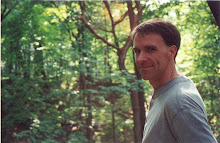
On my way out the door, I noticed the guard, who I had seen on a previous visit when I sidetracked from Cleveland specifically to see the Butler. He was a stocky, cheery African American guy with graying five o'clock shadow on the bottom of his round head and dark stubble on top of it. His nametag said "Wallace."
"Yeah," he answered, "You're pretty much isolated in the city, if you stayed. Everybody's out in the suburbs. They go out there just to get away, to be isolated. There's not too much exchange between people. It's people you know who you talk to: you went to school together, or we know each other; or we grew up then he moved out of the neighborhood. They're not connected other than that."
"Did you grow up in Youngstown?"
"Yes," he said formally, "yes, I did."
"I hate to shoot from the hip, but what about black-white relations in this town?"
"Yeah, okay, black and white relations in this town? It's okay. I was taught to learn how to deal with all creeds, colors, and nationalities. That's the way I was brought up. Okay? Now I guess there's this young generation that's coming up. Do you know this music they're listening to? They're angry. I'm like, 'Whatever is wrong, whatever it is, whatever had happened, forget about it.' That was over a hundred years ago. You know, now it's a new day, a new time.
"If anyone would have told me that it would have been like this twenty-five years ago, I would have never believed it. 'Cause, I'm saying, it was going in the right direction. But you got the kids with peer pressure, which is hell these days. When I was growing up the only peer pressure you had was worrying about drinking a beer and smoking a little marijuana. Now you have AIDS, you have crack, you have gangs. There's guns. It's serious.
"It just does not make any sense. Everybody should just stick together and work together and look at the bright side. And worry about these other nations that are taking jobs away. You have congressmen, who these people are signing it away. My father was a steel guy. He loved the mill. When they shut that mill down, they killed my father. Hundreds of people's fathers. This is what they went to war for. They turn over in their graves, to have today the leading nation in steel be foreign. What's going to happen if there's a major war break out? What are we going to do? Wait to go overseas to get the steel, and we're fighting against the ones that have it?"
Wallace stopped short to bid "Bye bye" to a woman leaving the museum.
"I love Edward Hopper paintings," he assured me. "I would like to go to The Art Institute of Chicago and see the one there. Nighthawks. Quite a few paintings I'd like to see in Chicago, like George Seurat.  The one where they're at the picnic and on the beach. That thing just blows me away, to see a little picture of it. I can only imagine how it looks as big as that wall. But I'm here. Six days a week workin' here. Been here seventeen years. Tryin', you know."
The one where they're at the picnic and on the beach. That thing just blows me away, to see a little picture of it. I can only imagine how it looks as big as that wall. But I'm here. Six days a week workin' here. Been here seventeen years. Tryin', you know."
20090219
159 Youngstown, OH: The Butler's Butler
Subscribe to:
Post Comments (Atom)




No comments:
Post a Comment